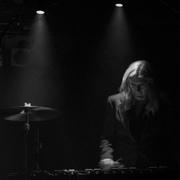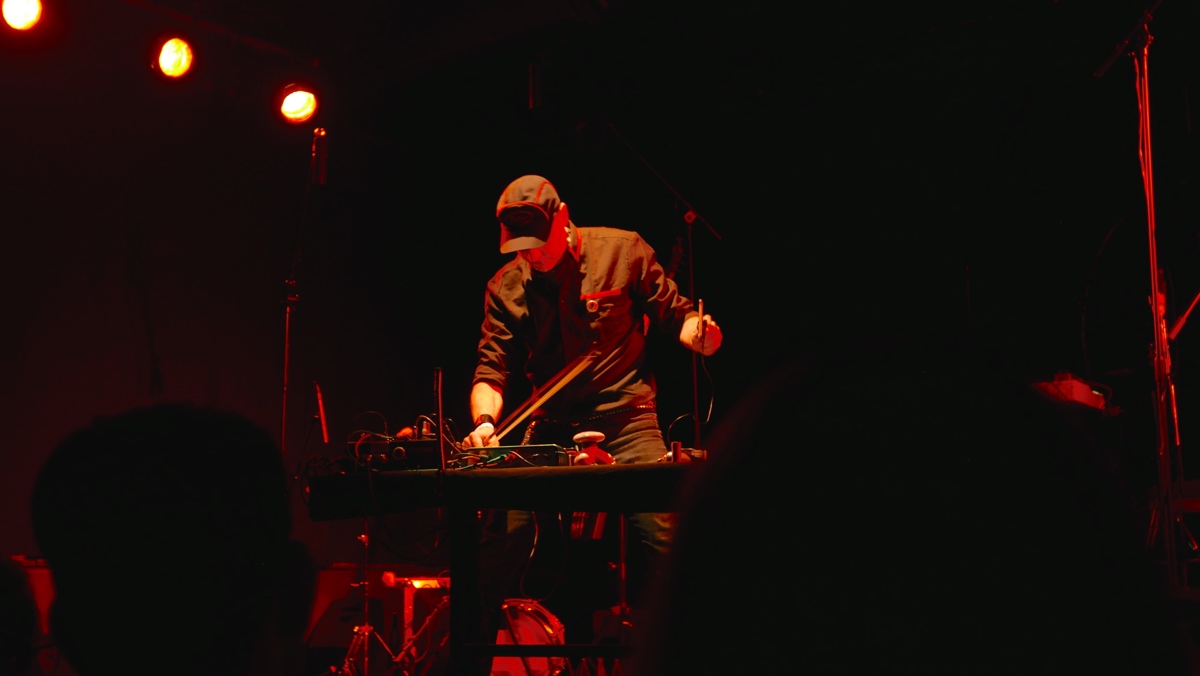Bohren und Der Club of Gore - 3 February 2018

With a special staff announcement concerning the unusual and atmospheric nature of the seated audience arrangement at the Kaserne, the tone for an evening of ambience and shadowy self-reflection was set. B°Tong's experimental ambient sound art would provide a resonant and effective introduction to the headliner's introspective late-night dark jazz, both benefitting from the sublime staging and lighting on show. Tonight's theme: let go and let the darkness wash over you.
B°Tong a.k.a. Chris Sigdell a.k.a. Satan
While Basel musician Chris Sigdell's highly experimental ambient electronic soundscapes may be well suited to some very introverted and isolated listening in a dark room with headphones (or as an alternate soundtrack to David Lynch's 1977 art film Eraserhead), a large part of the live entertainment value was seeing what strange contraption or everyday device, from a back massager to a slinky and many other metallic spring-like objects, he would choose next to create his unearthly industrial drones.
Bathed in blood-red lights and sporting a black and red uniform akin to that of a garage mechanic in hell, Sigdell uttered not a single word as he performed his uninterrupted half-hour set. Pings, clicks, and buzzes rang out over deep pulsating grinds and the occasional swipe of a bow across what looked like a potato peeler (presumably an electric pickup of some sort) and warped sound samples completed the interstellar isolation experience; Sigdell's cap simply reading the cursive-typeset "Satan" reinforcing the end station of this psychotropic train conductor's journey.
"Drei Opportunisten aus Westdeutschland"
You take a walk through the industrial part of town at 3 a.m. and light a cigarette, quietly contemplating where your life is headed as you drift from empty street to empty street. Gradually you notice the hushed sound of music escape over the steaming roofs of the towering buildings around you: at the street corner there is a dimly lit bar, light meekly leaking out from under the door. As you peer inside you see a man standing in front of a silent seated audience, his tenor saxophone in hand, and outside in the darkness it dips just below freezing.
If you ever watched Sherilyn Fenn dance slowly to some moody jazz in Twin Peaks and just couldn't get enough of it, Bohren und Der Club of Gore is the band for you.
Founded in Mülheim an der Ruhr, Germany, in 1992 as simply Bohren, the band members drew on their shared taste in doom metal and grindcore to create an unlikely self-proclaimed style of 'doom jazz', utilising snail's-pace bass, jangling late-night guitars, and snares brushed into a gentle hush to conjure up the film-noir feeling of walking alone down a dimly lit industrial cityscape.
This sludgy ambient aesthetic is prominent in their 1994 debut album Gore Motel, by the time of whose release they had altered their name to the current Bohren und Der Club of Gore – paying tribute to the Dutch instrumental hardcore band Gore, cited as an influence. 1997's addition of Christoph Clöser on saxophone and vibraphone prompted the next shift in their musical style, heading further into the pitch black ambient jazz atmospheres so present in David Lynch's films.
Playing pieces from their subsequent catalogue, ranging from Sunset Mission (2000) to Piano Nights (2014), Bohren und Der Club of Gore appeared to the intimate Kaserne crowd as the trio of Clöser (saxophone and vibraphone) and founders Morten Gass (keys) and Robin Rodenberg (double bass).
The staging of the concert proved just as crucial to its dusky atmosphere as the music on show; the seated audience almost lulled into a slumber as they were drawn into Bohren's glacial ambient soundscapes, straining to catch a glimpse of the players' faces masked by so much darkness. What little light succeeded in penetrating the inky black air came from small overhead spotlights scattered across the stage, or from the illuminated bass drums depicting a 1940s femme-fatale-esque character and a rather more 'metal' skull respectively.
Wir sind Bohren und Der Club of Gore: drei Opportunisten aus Westdeutschland...
- Christoph Clöser
Were it not for Clöser's bone-dry and surrealistic interjections that could have been written by Lynch or Jim Jarmusch (the piece Constant Fear apparently describes the feeling of people who spend the weekend riding elevators), the individual tracks would have almost indistinctly flowed from one to the next, weaving an improvisational collage of moody down-trodden cries of despair from Clöser's tenor saxophone set to Gass' Angelo Badalamenti-inspired mellotron atmospherics and delicate Fender Rhodes meanderings.
Piece titles such as Unrasiert and Skeletal Remains allude to the lethargic style of Bohren's doom jazz, but however morose and lifeless the conjured images may be, there is undoubtedly a soul to the band's music.
Clöser's utterly heartbroken and soulful saxophone playing called out for human contact in a bleak mechanised world reminiscent of Blade Runner, while the drums were ironically controlled remotely, if not fully sequenced - a mallet attached to a robotic arm striking a cymbal on the other side of the stage as if to suggest the ghostly presence of another musician (the band's original drummer Thorsten Benning quit in 2015).
Robin Rodenberg's calm, albeit amplified double bass provided resonating depth to the sound and, with the occasional jazz lick several octaves lower than they may normally be, reinforced the feeling of having entered an alternate-universe, future-noir jazz bar. Gass and Clöser alternately provided the keys to said bar, on the electric piano and vibraphone respectively, and so tied together the intoxicating and unrivalled atmosphere of their music, always maintaining a low-key mood.
Once the concert was over, the three black-clad men stepped out to the front of the stage to take a bow, their faces ever shrouded in shadows and mystery. The audience, heretofore only politely applauding each piece but otherwise remaining silent, now let out a surprising cheer for the understated performers.
Clöser took a sardonic and tongue-in-cheek jab at the bleak nature of life before catching himself and stating that in Basel everything is probably rosy, but in Westdeutschland... And so, having had their fill of film-noir doom and gloom, the diverse audience of old and young spilled out into the icy darkness of their own city streets, returning to that underground woodwork whence they came.
Isolation in the modern industrial world, with a heavy helping of self-deprecating misanthropy, informs Bohren und Der Club of Gore's overall style and mood - a bleak Ruhrgebiet of smog and sludgy rivers, populated by disparate faceless drones yearning for living contact and finding only the cold steel rails of ghost trains and gloomy stairwells leading to further darkness. Not in Basel, of course.
Bleibt fröhlich...
- Clöser
- Miles Prinzen



 This summer, trade your couch for a field and your playlist for a live band. Gather in open fields to listen to loud music and bust out questionable dance moves. Music festivals are back, featuring sun (hopefully), mud (probably), and bands you’ll claim to have discovered first. It’s a celebration of sound, sing-alongs, and Alpine views. Pack sunscreen and wellies and prepare to lose your voice.
This summer, trade your couch for a field and your playlist for a live band. Gather in open fields to listen to loud music and bust out questionable dance moves. Music festivals are back, featuring sun (hopefully), mud (probably), and bands you’ll claim to have discovered first. It’s a celebration of sound, sing-alongs, and Alpine views. Pack sunscreen and wellies and prepare to lose your voice.
.jpg)
.jpg)
.jpg)